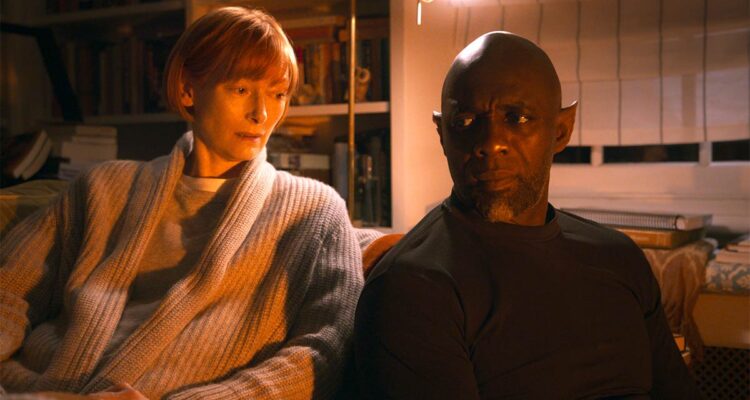As if unleashing all the pent-up narrative impulses tamped down for the hard-bitten minimalism of “Mad Max: Fury Road,” Australia’s proudest son George Miller returns to Cannes’ out-of-Competition section with a sumptuous banquet of storytelling in service of storytelling. “Three Thousand Years of Longing” compresses eons of heartbreak, happenstance, and hope into a hotel room tête-à-tête that then re-blooms to the size of the universe, a parable both titanic and intimate in scale as it negotiates one woman’s complacent solitude against the welfare of mythologies dating back to the cradle of civilization. In our technology-besotted present, the depth of human knowledge has degraded creation tales to the point that they’re mere fodder for superhero comics, but a chance encounter with the fantastic will reinvest a bit of awe in a world plagued by numbing manmade afflictions.
READ MORE: Cannes 2022 Preview: 25 Must-See Films To Watch
Renowned narratologist Dr. Alithea Binnie (Tilda Swinton) has come to Istanbul for one of the conferences that fill the time she’s not spending with the ex-husband whose memory she’s packed up into a box and stuffed in the basement, or the children she never had. For someone professionally well-acquainted with oral-tradition tropes, she doesn’t hesitate to give a good rub on a bottle picked up at a curiosities shop, and out pops a Djinn with the dusky voice and knee-weakening physique of Idris Elba. He grants her the customary trio of wishes, but she knows enough not to grab at billions or world domination, well aware that genies traffic in cautionary tales warning against avarice. In his effort to convince her that there’s no harm in spending this mystical windfall — and in doing so, freeing him from supernatural servitude — he relates the millennia he’s spent in search of a woman with desires he can fulfill, an evocation of Scheherazade as massive as the airplane we see emblazoned with her name.
From a royal court attended by animal-headed humanoid hybrids to a sable-fur-lined orgy chamber stocked with Rubenesque concubines, the Djinn’s voiceover whisks us away on a hyper-saturated CGI voyage through ancient Middle Eastern history while he enjoys a peaceful brunch back in Alithea’s hotel suite. (Here we have the good kind of special-effects showcase, the recklessly imaginative kind that turns an assassin’s popped-off noggin into a Lovecraftian-by-name spider monster that then dissolves into a horde of scarabs.) Considered individually, these mini-digressions don’t always convey the life-affirming morals appended to them by the summing-up of the third act, and in fact, one chapter seems to be an involved pretense for a rather unkind fatty-fall-down-go-boom gag. Even so, the sheer visual splendor makes these fanciful sequences hard to resist, infinitely more worthy of being marveled at than the similarly-budgeted Marvels.
The final stretch takes a somewhat turbulent pivot into sentimentality, outright stating its perspectives on the preciousness of life theretofore prudently left as suggestion. Particles suspended in the air hint that love is all around us, though that subtlety won’t deter Miller from tugging just a tad too hard on the ol’ heartstrings as he nudges Alithea and her darling Djinn into a romance uncommon for its middle-aged maturity. His transition from downtempo fantasy to a register grounded in the here and now falters in its attempt to interweave politics within philosophy, with a pair of xenophobic blue-hairs next door drawn thinly and redeemed all too hastily. Again, however, the winning elements in these scenes — namely, the tender chemistry between Swinton and Elba, an irresistible match in their downtempo resignation to the fates they might not be shackled to after all — make it difficult to hold their faults against them.
Joan Didion said (and a thousand Pinterest posts repeated) that we tell ourselves stories in order to live, an axiom Miller inverts to suggest that we must live in order to tell each other stories. Beneath all the juiced-up Tarsem Singh-isms, this is a film about that magical juncture in a blossoming relationship where you feel secure in sharing all the anecdotes that make up the most important, formative parts of yourself to another person doing the same, a postcoital post-midnight mood brightened in this case by morning’s light. No matter that wonder for wonder’s sake might be used to spackle over some of the borderline cornballery. The cumulative merits on display in Miller’s museum of amazement, from the whiz-bang recreations of freakified old-world grandeur to the humbler miracles shared between two wayward souls, we hang on every word of the narration — as sure a sign of a well-spun yarn as any. [B]
Follow along with all our coverage from the 2022 Cannes Film Festival.

